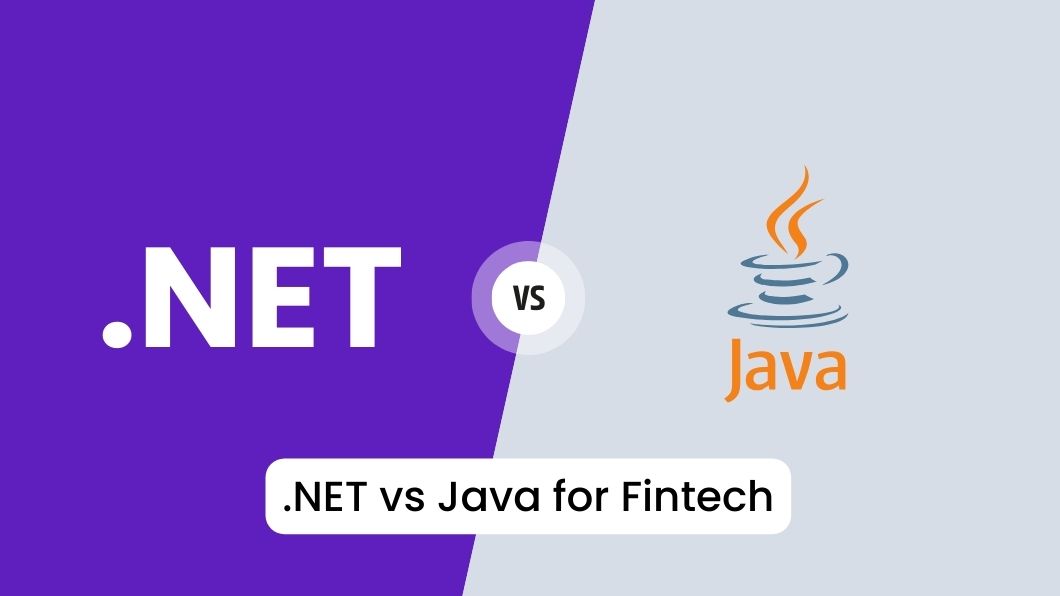Table of Contents
.NET vs Java for Fintech: Which One is More Cost-Effective and Secure?
When developing financial technology (Fintech) applications, choosing the right technology stack is crucial. Two of the most popular options are .NET and Java. Both have been battle-tested for building secure, scalable, and high-performance applications. However, when it comes to cost-effectiveness and security, which one stands out? This blog explores the strengths and weaknesses of .NET vs Java for Fintech, helping you make an informed decision.
Cost-Effectiveness: .NET vs Java
Development Costs
- .NET: Microsoft’s .NET ecosystem offers a streamlined development experience, particularly with tools like Visual Studio and Azure DevOps. However, licensing costs for Windows-based servers and enterprise-level tools can add to the total expense.
- Java: Java is open-source, and many of its tools (Eclipse, IntelliJ IDEA Community Edition) are free. While enterprise solutions like Oracle’s JDK may have licensing fees, the overall cost can be lower due to the broad availability of open-source alternatives.
Hosting and Infrastructure Costs
- .NET: .NET applications typically run on Windows servers, which can be more expensive than Linux-based alternatives. However, .NET Core and .NET 5+ have made cross-platform development easier, allowing applications to be hosted on Linux to reduce costs.
- Java: Java applications can run seamlessly on Linux, which is generally cheaper than Windows hosting. Cloud providers like AWS, Google Cloud, and Azure offer extensive Java support, making it a cost-effective option.
Developer Availability and Salaries
- .NET: .NET developers are widely available, but their salaries tend to be higher, especially for experienced professionals with knowledge of Azure and enterprise .NET frameworks.
- Java: Java developers are abundant, and the market has a vast talent pool. Java expertise is also highly sought after in Fintech, particularly for back-end systems and large-scale enterprise applications.
Security: .NET vs Java
Built-in Security Features
- .NET: Microsoft has a strong focus on security, providing features like Code Access Security (CAS), Windows Authentication, and built-in encryption libraries. Regular security updates and patches enhance its security profile.
- Java: Java offers robust security features, including the Java Security Manager, strong cryptographic libraries, and security policies that make it a preferred choice for banking and financial applications.
Compliance with Financial Regulations
Both .NET and Java offer compliance with financial industry standards like PCI DSS, GDPR, and ISO 27001. However:
- .NET: Works seamlessly with Microsoft Azure’s compliance-ready environment, making it easier to implement regulatory standards.
- Java: Java is widely used in banking applications, and frameworks like Spring Security provide strong compliance features for financial transactions.
Vulnerability and Threat Protection
- .NET: Since .NET applications are often hosted on Microsoft’s ecosystem, they benefit from enterprise-grade security solutions, including Microsoft Defender and Azure Security Center.
- Java: Java’s platform independence means applications are often hosted in diverse environments, requiring additional security configurations to prevent vulnerabilities.
Performance and Scalability: .NET vs Java
Performance
- .NET: Optimized for Windows and Azure, .NET offers high performance with Just-In-Time (JIT) compilation. It benefits from tight integration with Microsoft services, making it ideal for Fintech applications relying on Microsoft technologies.
- Java: Java’s Write Once, Run Anywhere (WORA) principle ensures performance consistency across platforms. The Java Virtual Machine (JVM) optimizes execution and can handle high-performance applications with minimal latency.
Scalability
- .NET: Best suited for enterprises already using Microsoft’s ecosystem. The integration with Azure provides seamless cloud scaling options.
- Java: Preferred for large-scale distributed systems, microservices architecture, and cloud-native applications. Java frameworks like Spring Boot and Quarkus enhance scalability and performance.
Ecosystem and Community Support
- .NET: Strong Microsoft support, frequent updates, and a robust developer community ensure stability. However, the ecosystem is more Microsoft-centric.
- Java: A vast open-source community, extensive libraries, and continuous innovation make Java a long-term player in Fintech development.
Final Verdict: Which One is Better for Fintech?
- Choose .NET if you are developing applications that rely on the Microsoft ecosystem, require seamless Azure integration, and need enterprise-grade security features.
- Choose Java if you are looking for a cost-effective, platform-independent solution with strong security features and a vast developer community. Java is ideal for large-scale Fintech applications and microservices-based architectures.
Frequently Asked Questions (FAQs)
Which is more cost-effective for Fintech: .NET or Java?
Java is generally more cost-effective due to its open-source nature and the ability to run on Linux-based, lower-cost infrastructure. However, .NET Core allows for cross-platform development, reducing Windows-related costs.
Is .NET or Java more secure for financial applications?
Both platforms offer strong security features, but .NET benefits from Microsoft’s enterprise-grade security solutions. Java’s security mechanisms, combined with frameworks like Spring Security, make it a reliable choice for financial applications.
Which one is better for cloud-based Fintech applications?
Both .NET and Java support cloud-based development. .NET integrates seamlessly with Azure, while Java has extensive support across AWS, Google Cloud, and Azure.
How does Zenkins help businesses choose the right technology?
Zenkins specializes in Fintech software development and offers expert consultation to help businesses choose between .NET and Java based on their security, cost, and scalability needs. We analyze your requirements and recommend the most effective solution.
Can Zenkins assist with migration from one technology to another?
Yes! Whether you want to migrate from Java to .NET or vice versa, Zenkins provides seamless migration services, ensuring minimal disruption and enhanced performance.
Conclusion
When comparing .NET vs Java for Fintech, both technologies have their strengths. The right choice depends on your budget, security needs, scalability requirements, and long-term infrastructure plans. Java offers greater cost-effectiveness and platform flexibility, while .NET provides a highly secure and enterprise-friendly environment. Evaluating your specific Fintech application needs will help you make the best decision.
Do you need expert guidance on choosing the right technology for your Fintech solution? Contact Zenkins today!




